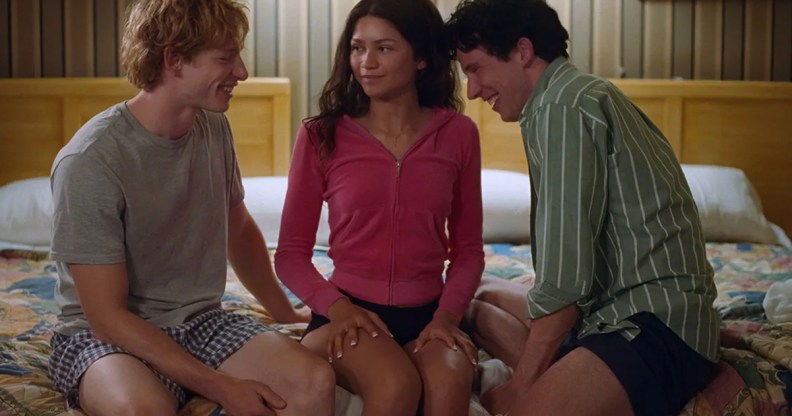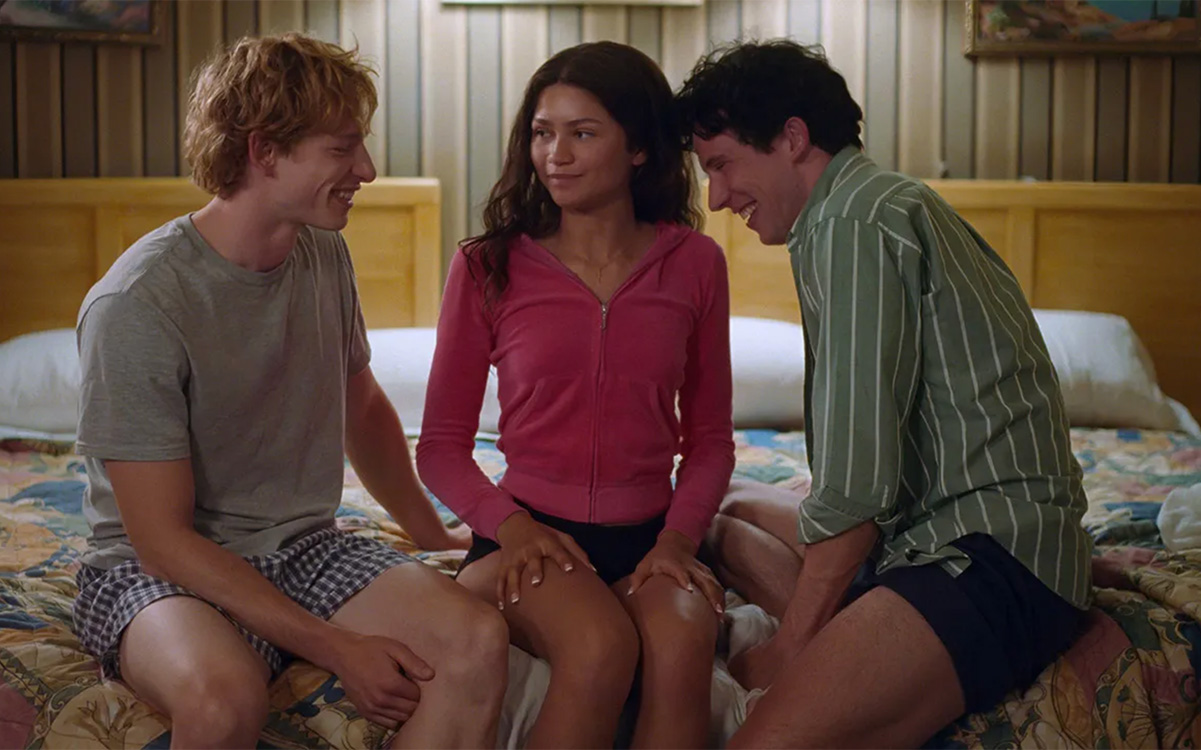
Viewers want a taste of polyamory after seeing the film. (MGM Amazon)
Challengers has been hailed for its sexy homoeroticism, as well as its poignant moments, but the romance drama has also served polyamory into the mainstream.
Though the film is a tennis movie, at its core it’s about the dynamics of the three central characters, Tashi (Zendaya), Art Donaldson (Mike Faist), and Patrick Zweig (Josh O’Connor).
Polyamory is explored in the queer-coded film aside from its sun-soaked matches on the court and tennis-core looks. One scene shows Tashi allowing the tennis pros the privilege of kissing her neck, if only to get the two men to get off with each other for her enjoyment.
Their polyamorous dynamic must have sparked something in viewers, because some fans have expressed their desire for their own “Challengers summer”. Forget hot girl summer, it’s time to explore being in a throuple.
“Two guys walking past me just said I look good. Challengers summer starts now,” wrote one viewer on X (formerly Twitter).
“Anyone want to see Challengers with me??? Maybe two guys??? Just a thought,” another added. “I wanna watch Challengers sitting in between two guys,” another echoed.
Another lamented: “3 tickets for challengers please. And it’s me and the two guys I wanna have at the same time.”
In fact, sexual wellness brand LELO found that following the movie, over a quarter of Brits would consider entering a polyamorous relationship. Meanwhile, 38% of 18-24-year-olds believed the idea of a polyamorous relationship would meet all their intimacy needs.
Kate Moyle, the brand’s sex and relationship expert, says that narratives and conversations in the media – like that of Challengers – are moving people “away from a ‘one-size fits all’ model of relationships to a more inclusive one.
“We are seeing this reflected in the statistics showing that people are being more explorative and open to trying ethical non-monogamy relationship models,” Moyle explains.
“The sexual wellness movement is encouraging people to find what’s right for them, which may lie outside of the relationship model that they previously felt that they had to subscribe to.
“As we read, learn, listen, talk and educate more and integrate and normalise ideas about sex and relationships taking different shapes into our lives, then we gradually move towards a place of greater acceptance,” she concludes.
How to open a relationship:
- Research is everything: Moyle suggests getting educated on polyamory “before you start anything, as non-monogamy takes many shapes and forms. It’s important to have at least an initial idea of what you may or may not be interested in, and for you and your partner to have discussed this.
- Communication is everything: “If you’re in a relationship, you have to discuss it with your partner first and this may take time,” Moyle suggests. “Talking about opening up your relationship is likely to be a discussion which is made up of multiple conversations. Don’t just expect you and your partner to be on the same page from day one – and have conversations honestly about what you are hoping to gain, what you are most worried about, most interested in, and importantly if you have any strong no-goes.”
- Set ground rules: “Be prepared to establish ground rules which, even if you have been together a long time, you may have never explicitly done before. Often in relationships, we just fall into a pattern and a way of being without ever having an explicit conversation,” Moyle says.
- First-time nerves: While movies like Challengers may romanticise polyamory, like any new relationship or sexual experience, the first time is rarely the best. “Understand that the first experience that you have may not be the perfect one, or may not be what you were thinking it would be,” Moyle says. “Expectation can often really hinder our reality of situations and we can treat these as learning experiences rather than failures. Not every first date turns into a relationship, and we don’t develop a relationship with every single person we meet in life and we should treat opening our relationship up the same way.”
